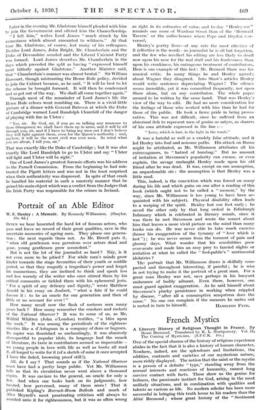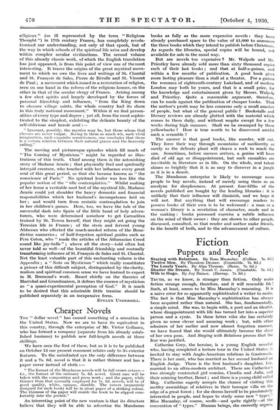French Mystics
A Literary History of Religious Thought in France. By Henri Bremond. Translated by K. L. Montgomery. Vol. II The Coming of Mysticism. (S.P.C.K. Ifs.) ONE of the special charms of the history of religious experience abides in the fact that it is also a history of human character. Nowhere, indeed, are the splendours and limitations, the oddities, contrasts and varieties of our mysterious nature, more richly displayed. The notion that the saint or the mystics is a person of a definite "type," standing away from the normal interests and reactions of humanity, cannot long survive contact with facts. These show us the genius for holiness, the passionate instinct for God, arising in the most unlikely situations, and in combination with qualities and talents as various as life. No modem scholar has been more successful in bringing this truth home to his readers than the Abbe Bremond ; whose great history of the "Sentiment
religieux " (so ill represented by the term "Religious Thought ") in 17th century France, has completely revolu- tionized our understanding, not only of that epoch, but of the way in which schools of the spiritual life arise and develop within complex secular civilizations. The second volume of this already classic work, of which the English translation has just appeared, is from this point of view one of the most interesting. It traces the origins of the great mystical move- ment to which we owe the lives and writings of St. Chantal and St. Francois de Sales, Pierre de Berulle and St. Vincent de Paul ; a movement which issued in a restoration of religion, seen on one hand in the reform of the religious houses, on the other in that of the secular clergy of France. Arising among a few elect spirits and largely developed by the forces of personal friendship and influence, "from the King down to obscure village saints, the whole country had its share in this truly national movement." Within it we find person- alities of every type and degree ; yet all, from the most sophis- ticated to the simplest, exhibiting the delicate beauty of the self-oblivious and heroic soul :—
" Ignorant, possibly, the mystics may be, but those whom God chooses are never vulgar. Seeing in them so much wit, such vivid imagination, such exquisite sensitiveness, one concludes that there is a certain relation between their natural graces and the heavenly The moving and picturesque episodes which ffil much of "The Coming of Mysticism" might be regarded as illus- trations of this truth. Chief among them is the astonishing story of Madame Acarie ; that physically frail and spiritually intrepid creature, who touched with her influence every great soul of this great period, so that she became known as "the conscience of Paris." No spiritual leader was less like the popular notion of the "idle contemplative." Whilst making of her home a veritable seed bed of the mystical life, Madame Acarie could yet shoulder the heavy domestic and financial responsibilities which her husband's incompetence laid on her ; and would turn from ecstatic contemplation to join in her children's games. Here, too, we have the tale of the successful dash into Spain of the little band of holy adven- turers, who were determined somehow to get Carmelites trained by St. Teresa herself, that they might set going the Teresian life in France ; of the stern and fervent young Abbesses who effected the much-needed reform of the Bene- dictine nunneries ; of half-forgotten spiritual guides such as Pere Coton, who " made the articles of the Athanasian Creed sound like joy-bells " ; above all the story—told often but never told so well—of the beautiful friendship and mutually transforming influence of St. Francois de Sales and St. Chantal. Not the least valuable part of this enchanting volume is the Appendix ; a "Note on Mysticism" which really constitutes a primer of this difficult subject, distinguished by the clarity, realism and spiritual common sense we have learned to expect in M. Bremond's work. Based chiefly on the theories of Marechal and Grandmaison, it defines the essence of mysticism as "a quasi-experimental perception of God." It is much to be desired that this admirable little treatise should be published separately in an inexpensive form.
EVELYN UNDERHILL.





















































 Previous page
Previous page